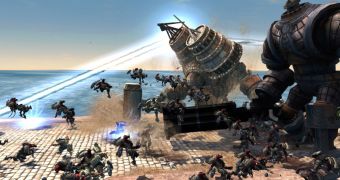This week was set to witness the release of Demigod, quite an interesting title created by Gas Powered Games and published by Stardock. The game has both a retail version and a digital distribution version. It focuses on multiplayer, with the network infrastructure and the match making services crucial for a good experience. The release was set for April 14.
Unfortunately, the launch did not go well on April 13, as GameStop, one of the retailers selling the game, decided to offer it to customers one day earlier. As the game was not officially out yet, the multiplayer component was not too satisfying. They began posting on the Stardock forums and the team behind the game got on the act, although they we're enjoying Easter after a few months of crunch time before the release of Demigod.
Stardock moved quickly, allowed those who had pre-ordered digitally to get the game early and set about making sure that its servers could accommodate the influx of players. Now, the company says that most problems related to the early launch have been solved and that it is working on making Demigod as good of a game as it can be.
The problem is that a very wrong move by GameStop could end up costing Stardock quite some money. For one, there's the possibility of a higher piracy rate for the title, because there were copies in the wild before the official release date. Also, some players might not recommend Demigod to friends based on the botched launch experience. Stardock had to work overtime to make the launch day fiasco disappear. Nobody had to gain, not even GameStop, which has been shamed by numerous press outlets and which might never again get Stardock videogames before the official release date.
Some say that GameStop made its move in order to show that the brick and mortar store still holds power, despite the big impact that digital distribution channels, like Impulse, have. Unfortunately, its attempt at a power play will probably misfire, with developers who can get their videogames on digital distribution services being more circumspect of retail stores and with clients also re-orienting their money to them, based on the idea that they will get better service from them.
All in all, the move was bad for both GameStop, which faces losing its business, and for Stardock, which has to clean up the launch mess. The main question is who is set to lose more if a war between digital distribution and retail stores begins. Readers, what do you think? Will you buy from GameStop? Are you more interested in digital distribution?

 14 DAY TRIAL //
14 DAY TRIAL //